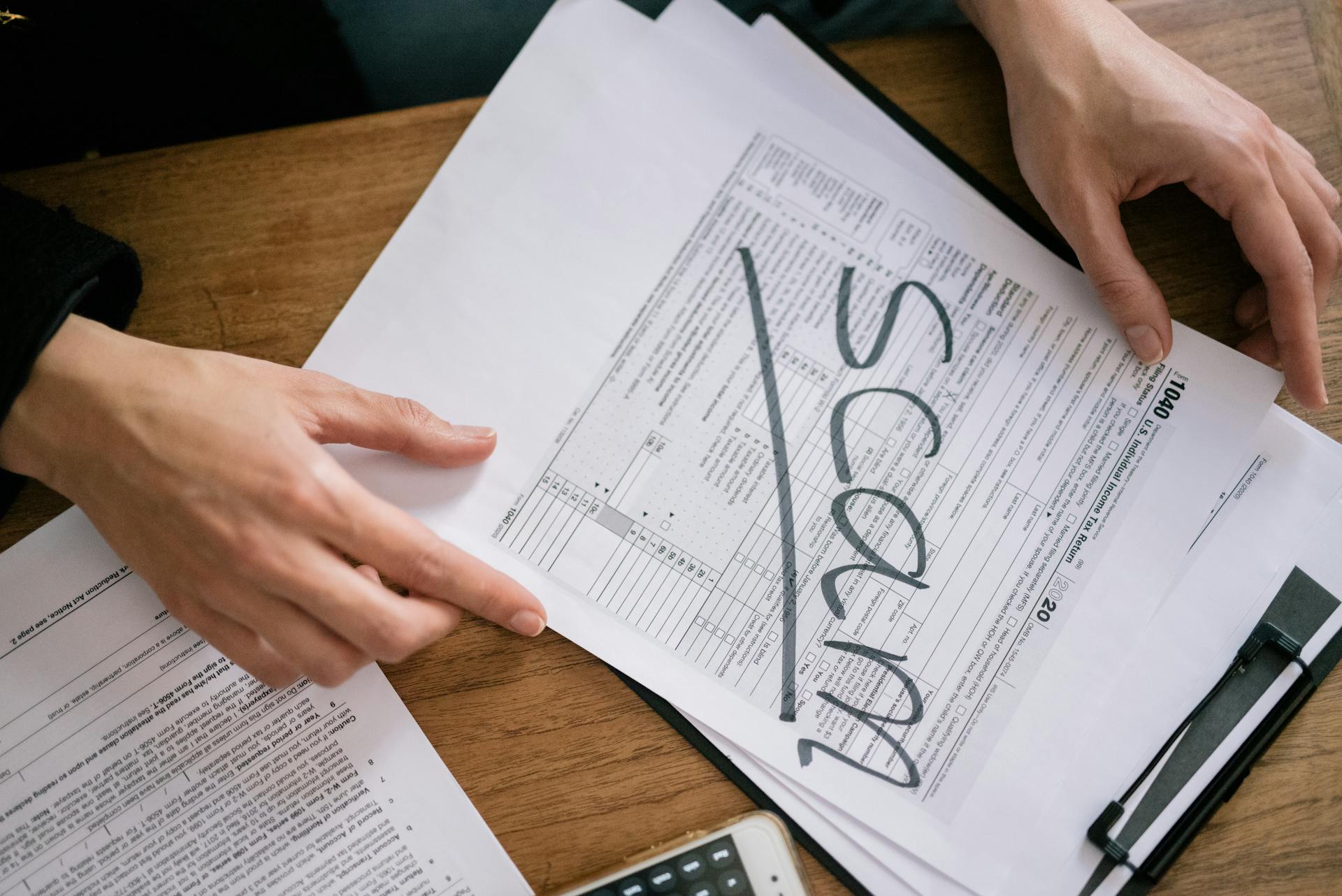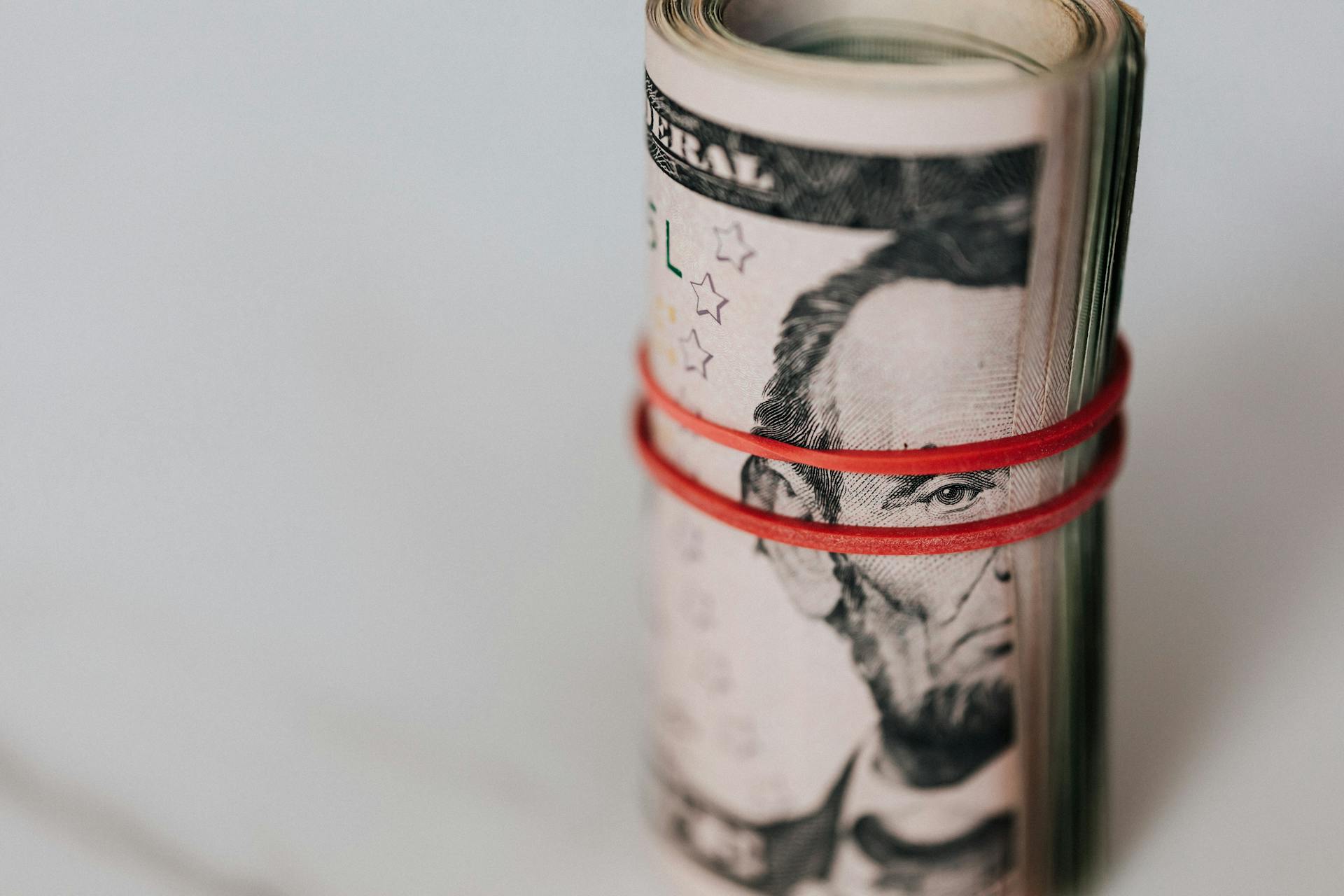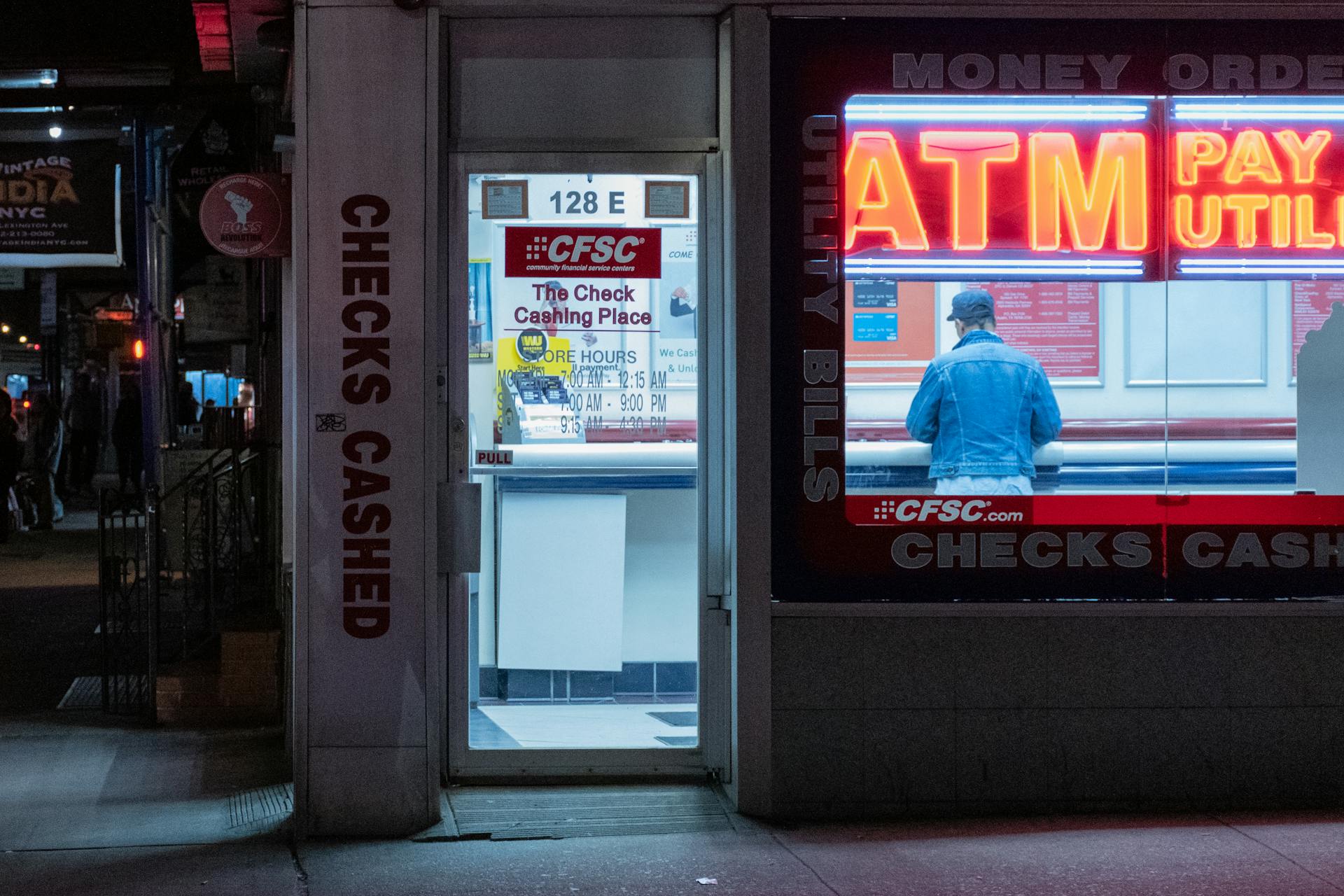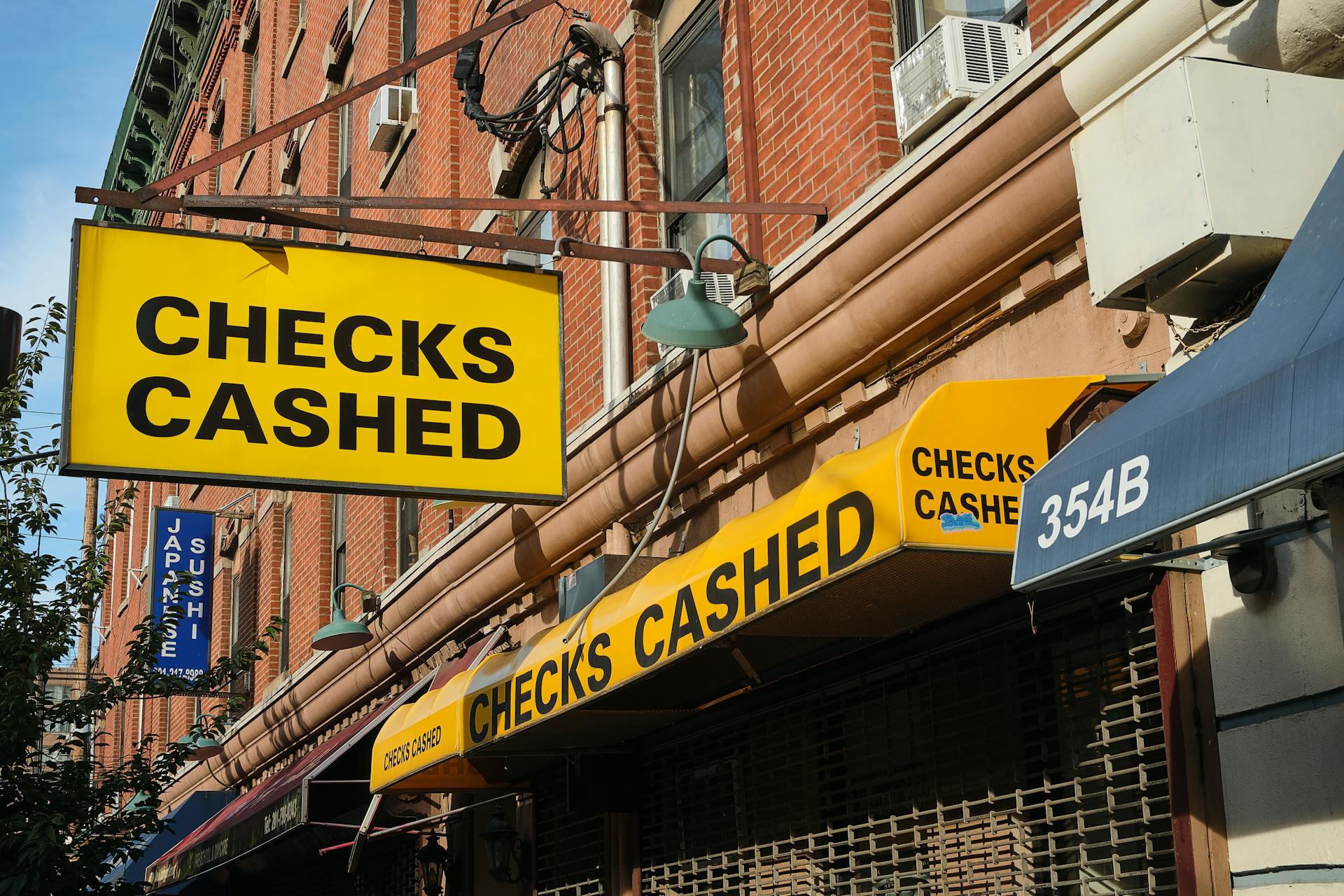
Cash advance checks can be a convenient option for people in a financial pinch, but they often come with high fees and interest rates.
These fees can add up quickly, with some lenders charging up to 5% of the check amount.
If you're considering a cash advance check, it's essential to understand the costs involved.
The average cash advance check is around $500, but some lenders may offer higher or lower amounts.
What Is a Cash Advance?
A cash advance is a service offered by credit card issuers that allows you to withdraw cash against your credit limit. You can access this cash through ATMs, bank tellers, or by using checks provided by the credit card company.
You can use a cash advance for emergency expenses, such as unexpected medical bills or vehicle repairs. For example, if your car breaks down, a cash advance can provide immediate access to cash when other funds might not be readily available.
Here are some situations where someone might need a cash advance:
- Emergency Expenses: unexpected medical bills or vehicle repairs
- Travel Needs: tips, transportation, or local purchases
- Immediate Cash Flow Issues: temporary cash shortfalls before a paycheck arrives
- Unforeseen Events: natural disasters or urgent home repairs
It's essential to be mindful of the costs associated with cash advances, including high interest rates and fees.
Getting a Cash Advance
You can get a cash advance in three ways: at an ATM, at your bank, or over the phone. However, not all credit card issuers allow you to complete a cash advance over the phone.
The amount you can withdraw through a cash advance varies, but you can typically get anywhere from $100 to 30% of your credit limit. This amount will be deducted from your available credit, plus the cash advance fee.
To get a cash advance at an ATM, you'll need your credit card's PIN. If you don't know your PIN, you can request it online from your issuer. At a bank, you'll need proper identification to access the cash advance.
How to Get Credit Card Checks
You can get credit card checks by calling the number on the back of your credit card to request one from your issuer. Some issuers send convenience checks with your monthly statement, while others offer them periodically to cardholders with good credit.
These checks function almost exactly like personal checks and can be used to pay rent, make utility payments, or send money to friends and family.
However, be aware that convenience checks can be expensive due to cash advance fees. You'll typically pay a fee of 3 percent to 5 percent of the check amount, and the amount you borrow might be cashed against a lower cash advance limit than your regular credit limit.
To use a convenience check, fill it out as you would a personal check and deposit it wherever checks are accepted.
Doesn't Require Collateral
One of the biggest benefits of a cash advance is that it doesn't require collateral. This means you won't have to put up a valuable asset, like a car or a house, to secure the loan.
You might be wondering why this is a big deal, but trust me, it's a huge relief. Not having to worry about collateral means you can get the cash you need without risking something you can't afford to lose.
This is especially important if you're in a tight spot and need access to cash quickly. With a cash advance, you can get the money you need without having to put up collateral, giving you more freedom and flexibility.
Costs Involved
Taking out a cash advance check can come with some hefty costs.
You'll typically be charged a cash advance fee, which can range from 3% to 5% of the amount advanced, or a flat rate, often added to the total amount withdrawn. For example, if the fee is set at $10 or 3% of the transaction amount, and you withdraw $100, you could end up paying the higher amount of $10.
Some cash advance fees have a minimum amount associated with them, so even small withdrawals can lead to substantial fees.
Here are the costs involved in taking a cash advance:
These costs can add up quickly, so it's essential to weigh them against your immediate cash needs to avoid unexpected financial pressure.
Alternatives and Comparison
If you're considering a cash advance check, it's essential to explore alternatives that might be more cost-effective. Payday loans, for instance, can charge nearly 400% APR when combining all fees.
Cash advances are generally less expensive than payday loans. In fact, they can be a more affordable option when you need money fast.
However, it's crucial to weigh the pros and cons of cash advances before making a decision. A cash advance can have more cons than pros, but it may make sense in some cases.
Lower Costs Than Payday Loans
If you're considering payday loans as an option, you might want to think twice. Payday loans can charge nearly 400% APR when you combine all the fees.
A cash advance is a more affordable choice, with lower costs compared to payday loans. This is especially true when you need money fast.
The high APR of payday loans can lead to a cycle of debt, making it difficult to pay back the loan. In contrast, a cash advance can provide a more manageable financial burden.
Payday loans often have hidden fees that can add up quickly, making the loan even more expensive. A cash advance, on the other hand, is a more straightforward option with fewer surprises.
Alternatives to Cash
Cash advances aren't a good option because of the cash advance fee and high APR. They're an expensive way to access cash.
You can consider using a credit card with a 0% introductory APR to access cash. This can be a better option than a cash advance, especially if you can pay off the balance before the introductory period ends.
If you have a credit card with a 0% introductory APR, you can also use it to make purchases and pay off the balance over time. This can be a more affordable way to access cash than a cash advance.
Some credit card companies also offer cash back rewards or other benefits that can help offset the cost of accessing cash.
Pros and Cons
A cash advance can be a costly option, with interest rates often exceeding 30% or more. This high interest can lead to a cycle of debt that's difficult to escape.
Before considering a cash advance, it's essential to weigh the pros and cons. A cash advance may make sense in some cases, but it's crucial to consider all your options first.
The main con of a cash advance is the high interest rate, which can quickly add up and lead to financial trouble. This is because cash advances often have fees and interest rates that are higher than traditional loans.
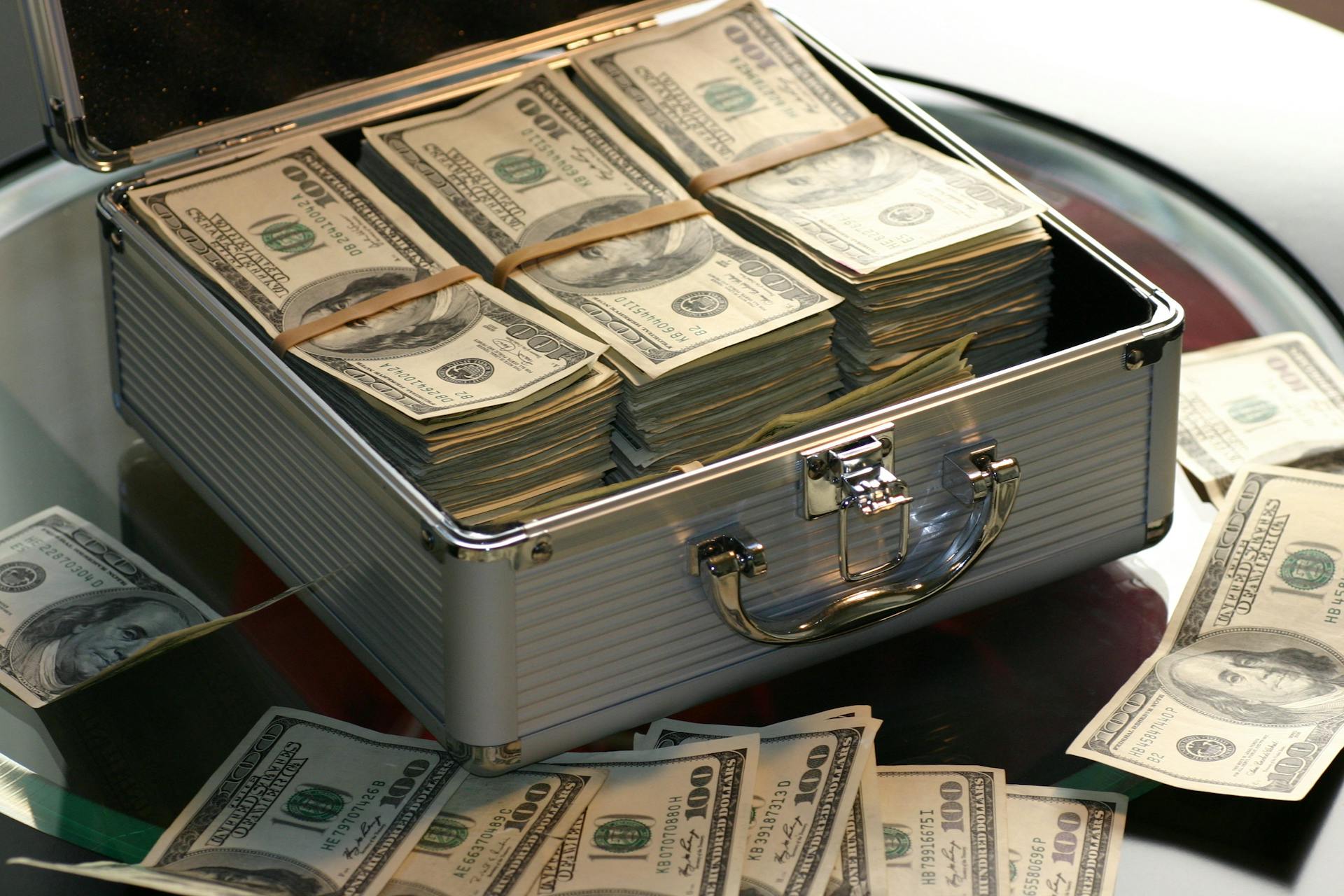
In some cases, a cash advance may be necessary due to unexpected expenses or financial emergencies. However, it's vital to explore other options before resorting to a cash advance.
A cash advance can have more cons than pros, but it may make sense in some cases. Consider all your options before landing on a cash advance.
Impact on Credit and Responsibility
Cash advances can have a significant impact on your credit score if not managed carefully. A high credit utilization ratio, which is the amount of credit you're using compared to your total available credit, can signal to lenders that you may be overextended.
Ideally, your credit utilization ratio should remain below 30% to positively affect your credit score. A higher ratio can lead to a lowered score. Late payments on cash advance balances contribute to negative credit reporting, while a high balance relative to your credit limit can further diminish your creditworthiness.
To avoid these negative effects, it's essential to approach cash advances judiciously and have a clear repayment plan in place. Consider the following tips:
- Only take what you need: Withdraw the amount necessary for your immediate needs to limit potential fees and interest.
- Plan for repayment: Determine how and when you will repay the advance and make repayments as soon as possible to avoid accruing excessive interest.
- Avoid repeated cash advances: Relying on cash advances as a frequent solution can lead to financial strain and increase your overall debt.
- Monitor your credit card statements: Keep a close eye on your credit card statements to track your cash advance and associated interest charges.
Impact on Credit Score
Taking out a cash advance can significantly impact your credit score. This is because the amount withdrawn counts against your credit limit, increasing your credit utilization ratio.
Ideally, your credit utilization ratio should remain below 30% to positively affect your credit score. A higher ratio can signal to lenders that you may be overextended.
Late payments on cash advance balances can contribute to negative credit reporting. This can have serious consequences for your credit score.
A high balance relative to your credit limit can further diminish your creditworthiness. This can make it harder to secure loans, obtain new credit cards, or even influence rental agreements.
If cash advances are not repaid promptly, the long-term effects can be substantial. This can lead to a cycle of financial strain that might prompt late payments or defaults.
A clear repayment plan is essential to safeguard your financial future. This will help you avoid the negative impact on your credit score.
Managing Responsibly
Only take what you need to avoid excessive fees and interest. By limiting your withdrawal amount, you can more easily manage repayment and reduce the impact on your overall financial health.
A clear repayment strategy is essential before taking a cash advance. Determine how and when you will repay the advance and try to make repayments as soon as possible to avoid accruing excessive interest.
Relying on cash advances as a frequent solution can lead to financial strain and increase your overall debt. Instead, seek alternative solutions for financial needs and consider building an emergency fund to avoid the need for advances in the future.
Monitoring your credit card statements is crucial to track your cash advance and associated interest charges. Regular monitoring enables you to identify any discrepancies quickly and maintain awareness of your credit utilization ratio.
Here are the key takeaways to manage cash advances responsibly:
- Only take what you need
- Plan for repayment
- Avoid repeated cash advances
- Monitor your credit card statements
Writing and Using Checks
You can write a check by signing the back of the check and filling in the date, payee, and amount.
The check should be written in ink, not pencil, to ensure it can't be altered.
A check can be made out to anyone, as long as you have a valid reason for paying them.
Make sure to include the payee's address on the check, as this is a requirement for most banks.
The check amount should be written clearly and correctly, including the dollar sign and decimal point.
You can also write a memo on the check to explain the purpose of the payment.
Most banks have a time limit for depositing and cashing checks, usually 30 to 60 days.
It's a good idea to keep a record of your checks, including the date and payee, in case you need to refer to them later.
Make sure to sign the check in the presence of a witness, if required by your bank.
Key Information and Considerations
Convenience checks can be processed as a cash advance, which can be expensive due to fees and interest rates. This can cost you a lot more money than you anticipated.
You can use credit card checks to make purchases, pay off other credit cards, or pull cash advances from your line of credit. However, it's essential to consider the potential drawbacks.
A number of today's best credit cards offer convenience checks, but it doesn't mean they're always a good option. Writing a convenience check might be a costly decision.
You can cash convenience checks at a bank or credit union, but be aware of any associated fees. It's also possible to cash them at a check cashing store or other financial institutions.
Using a convenience check to borrow against your credit card can have a negative impact on your credit score. This is because it's considered a cash advance, which can be viewed as a sign of financial distress.
Here are some potential alternatives to consider:
- Consider a personal loan with interest rates often much lower than cash advance interest rates.
- Earn extra cash through a side hustle, such as starting your own business or signing up with a service like Uber or DoorDash.
Frequently Asked Questions
What are cash advance checks?
Cash advance checks allow you to borrow money from your credit card account, making it easy to cover expenses or transfer balances. They're a convenient way to access cash when you need it.
What is a $200 convenience check?
A convenience check, like a $200 one, is a check offered by your credit card issuer that lets you borrow money from your available credit line. It's essentially a way to access your credit limit in a more traditional check form.
Sources
- https://www.pressdemocrat.com/article/news/printed-checks-included-in-your-billing-treated-like-cash-advances-on-your/
- https://www.fdic.gov/consumer-resource-center/2023-01/credit-card-checks-and-cash-advances
- https://www.bankrate.com/credit-cards/advice/understanding-convenience-checks/
- https://www.citizensbank.com/learning/what-is-a-cash-advance.aspx
- https://www.edvisors.com/credit-cards/credit-card-faqs/cash-advances/
Featured Images: pexels.com
